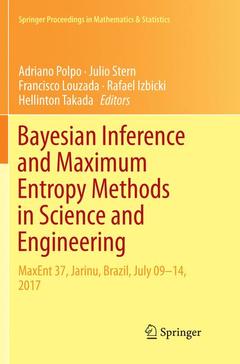Bayesian Inference and Maximum Entropy Methods in Science and Engineering, 1st ed. 2018 MaxEnt 37, Jarinu, Brazil, July 09–14, 2017 Springer Proceedings in Mathematics & Statistics Series, Vol. 239
Coordonnateurs : Polpo Adriano, Stern Julio, Louzada Francisco, Izbicki Rafael, Takada Hellinton

These proceedings from the 37th International Workshop on Bayesian Inference and Maximum Entropy Methods in Science and Engineering (MaxEnt 2017), held in São Carlos, Brazil, aim to expand the available research on Bayesian methods and promote their application in the scientific community. They gather research from scholars in many different fields who use inductive statistics methods and focus on the foundations of the Bayesian paradigm, their comparison to objectivistic or frequentist statistics counterparts, and their appropriate applications.
Interest in the foundations of inductive statistics has been growing with the increasing availability of Bayesian methodological alternatives, and scientists now face much more difficult choices in finding the optimal methods to apply to their problems. By carefully examining and discussing the relevant foundations, the scientific community can avoid applying Bayesian methods on a merely ad hoc basis.
For over 35 years, the MaxEnt workshops have explored the use of Bayesian and Maximum Entropy methods in scientific and engineering application contexts. The workshops welcome contributions on all aspects of probabilistic inference, including novel techniques and applications, and work that sheds new light on the foundations of inference. Areas of application in these workshops include astronomy and astrophysics, chemistry, communications theory, cosmology, climate studies, earth science, fluid mechanics, genetics, geophysics, machine learning, materials science, medical imaging, nanoscience, source separation, thermodynamics (equilibrium and non-equilibrium), particle physics, plasma physics, quantum mechanics, robotics, and the social sciences. Bayesian computational techniques such as Markov chain Monte Carlo sampling are also regular topics, as are approximate inferential methods. Foundational issues involving probability theory and information theory, as well as novel applications of inference to illuminate the foundations of physical theories, are also of keen interest.Adriano Polpo, Ph.D., is an Associate Professor of Statistics at the Federal University of Sao Carlos (UFSCar, Brazil). He received his B.Sc. in Statistics from the State University of Campinas, his Ph.D. in Statistics from the University of Sao Paulo, and he was Research Associate at Florida State University. He is the coordinator of the research group GIS (Group of Inductive Statistics), and is the coauthor of more than 30 publications in statistical peer-reviewed journals, books, and book chapters. Dr. Polpo has served as Head of the Department of Statistics at UFSCar and President of the ISBrA (the Brazilian Chapter of the International Society for Bayesian Analysis).
Julio Michael Stern, Ph.D., is a Full Professor at the IME-USP (Institute of Mathematics and Statistics of the University of Sao Paulo) and Research Fellow of the CNPq (Brazilian National Council for Science and Technology). He received his B.Sc. and M.Sc. in Physics from the University of Sao Paulo, his Ph.D. in Operations Research from Cornell University, and his Liv.Doc. in Computer Science from the University of Sao Paulo. He was President of the ISBrA (Brazilian Chapter of the International Society for Bayesian Analysis) from 2010 to 2012 and the organizer of MaxEnt 2008. He has published several books and articles in the areas of Epistemology and Logic, Mathematical Modeling and Operations Research, Statistical Theory and Methods, and Sparse and Structured Systems.
Francisco Louzada, Ph.D., is a Full Professor of Statistics at the Department of Applied Mathematics and Statistics, University of Sao Paulo (ICMC-USP, Brazil); Research Productivity Fellow of the Brazilian founding agency CNPq, Level 1; Director of the Center for Risk Analysis (CER); Director of the Center for Applied Mathematics and Statistics in Industry (CeMEAI); Director of Technology Transfer, and Executive Director of External Relations at the Center for Researc
Presents cutting-edge research from a wide variety of science and engineering fields that use inductive statistics
Examines and discusses the foundations of inductive statistics, addressing the growing difficulty in choosing the optimal method to apply to problems due to the increasing availability of Bayesian methodological alternatives
Expands the available research on Bayesian methods and promotes their application in the scientific community
Date de parution : 01-2019
Ouvrage de 304 p.
15.5x23.5 cm
Disponible chez l'éditeur (délai d'approvisionnement : 15 jours).
Prix indicatif 179,34 €
Ajouter au panierDate de parution : 07-2018
Ouvrage de 304 p.
15.5x23.5 cm
Disponible chez l'éditeur (délai d'approvisionnement : 15 jours).
Prix indicatif 179,34 €
Ajouter au panierThème de Bayesian Inference and Maximum Entropy Methods in... :
Mots-clés :
Entropy; Imprecise Probability; Maximum Entropy; Biostatistics; Non-parametric Mmethods; Survival Analysis; Statistical Models; Astrophysics; Chemistry; Communications Theory; Comology; Climate Studies; Earth Science; Fluid Mechanics; Genetics; Geophysics; Machine Learning; Material Science; Medical Imaging; Robotics



